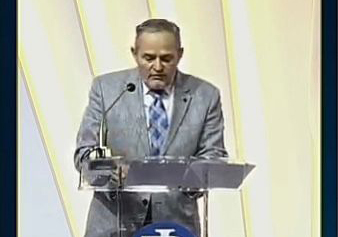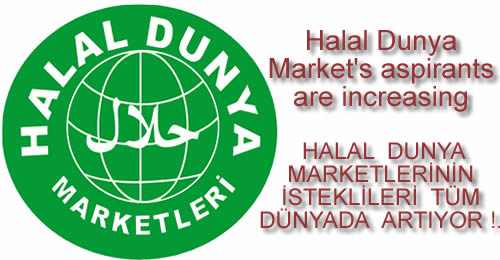In the invitation letter sent to GIMDES;
“The Indonesian Halal Product Assurance Organizing Agency (BPJPH) – Ministry of Religious Affairs of the Republic of Indonesia is pleased to be the host of the 4th International Halal Dialogue (IHD) 2022, as part of the Indonesian Sharia Economic Festival (ISEF) held by Bank of Indonesia. We would like to invite you to join us at the 4th IHD on:
Day/Date : Friday, 7th October 2022
Time : 09.00 – 17.00 Jakarta Time (GMT+7)
Place : Jakarta Convention Centre
Meeting Link : (to be informed later)
The theme of this year’s IHD is “Accelerating Halal Certification for Supporting Economic Recovery” which is related with the G-20 “Recover Together, Recover Stronger” under Indonesia Presidency. With that spirit, we hope halal industry become one of the significant factors in economic recovery post pandemic COVID-19.”
GIMDES External Affairs Consultant and World Halal Council Chairman of the Board of Directors Mr. Zafer GEDIKLI attended this meeting and made a very important and historical speech in a period of about half an hour.
Zafer Gedikli made a speech on behalf of WHC at the 4th International Halal Dialogue conference organized by Indonesia. In his speech emphasizing the importance of the partnership of Halal certification Bodies (HCB), Mr. Zafer emphasized the importance of increasing communication between HCB, the competitive environment between HCB is not in accordance with Islam, the basis on which Halal Certification should be based, the WHC has the first and most reliable standard for common halal certification, that other standards (such as ISO) will never replace “Halal” and the WHC code of conduct.
We present the simplified text of the speech below to the public’s benefit.
You can download the entire text by clicking the link below.
SIGNIFICANCE OF HALAL CERTIFICATION BODIES PARTNERSHIP
Halal belongs to Allah. Allah helps the ones who help his religion. Without the blessing of Allah, we are nothing.
As HCBs, the quality of our job is more important as our work is only for the consent of Allah. It is important to note that Halal certification is not a business, it is a noble means to serve Muslims and the wider community. As Muslims, we are duty-bound to support, cooperate and assist each other, especially in the noble service of Halal provision for the Global Muslim Ummah.
Allāh Ta’ālā commands us in the Glorious Qur’ān, “And cooperate [with each other] in deeds of righteousness and virtue and do not assist [one another] in acts of sin and aggression”. (Surah 5; Ayat 2)
Our philosophy in Halal certifying should depend on the following 3 criteria:
-Halal and Tayyib
-Maslahat of Muslims
-Taqwa principle
Halal: You know already what is Halal and not Halal.
Tayyib: You also know what Tayyib means as a word. The question is this: Are we looking at the tayyibness of the product or service when we certify? As HCBs, we should be very cautious in accepting a new ingredient or a new process. Just remember that MSG was considered a miraculous product. Now it is banned in many countries because of its proven bad effects on human body. In some places, they certify carbonated soda beverages that contain acids. Such products contain phosphoric acid which is harmful to human body. They also contain too much sugar or sweetener. It is obviously not healthy although contents may be from Halal sources only. So why certify it?
Maslahat of Muslims (Interest of General Muslim Public): Sometimes the product itself or producer company does not deserve to be certified. For example, some companies mock Islamic values, ban head scarf for Muslim ladies, don’ allow praying etc. They may also support different kinds of unIslamic behaviours, or acts as we know as sin (for example, they claim support homosexuality, adultery etc but on the other hand they want to get Halal certificate.). I am not going into more details but if the applicant does not respect Islam, no Halal certification will be granted.
Taqwah: One more important principle is that we should not be making Halal certification easy for the industry or for the applicant. We are here to serve Islam and Muslims, not to serve the industry. We must be very strict, follow the protocols and not tolerate. Because we will account for what we do to Allah. Our certification must guarantee that the most muttaqi person (the one who has the most taqwah) should be able to consume the product without questioning. This will be safer for everyone and will increase the standards. Consider Stunning. When you open doors to stunning, industry always finds cheaper ways to stun and they convince or sometimes enforce other parties to accept it. Remember the gas stunning. While we were discussing whether we could accept water bath stun, some European countries allowed gas stunning as the only acceptable method. As Muslims, shall we accept such pressure? We are implying that we must be the ones that will say how to do it. What we say and eventually accept must be Islamic. If it doesn’t conform to Islam, there is no certifying.
I also have a few words about one Halal standard. HCBs have been discussing this for a very long time. After almost 40 years, we can say that different groups prepared several standards and guidelines for Halal certification. WHC is one of the first among them and I proudly say that WHC Standard Halal guidelines is a real guide that can be easily adopted and followed.
As WHC members, we follow a set of rules which we call as Code of Conduct.
1. Interest of the general Muslim Public – It undertakes to conduct Halal certification in the interest of the general Muslim public
2. Ethical Framework – To conduct it’s operations within an Islamic ethical framework
3. Best business practice – To subscribe to best business practice
4. Compliance – To comply with all applicable legislation, industrial instruments, professional codes of conduct and World Halal Council policies.
5. Competence – Not to conduct certifying functions beyond its level of competence or outside its area of expertise.
6. Respect – To respect and maintain the professional independence and autonomy of affiliate members
7. Integrity – To execute its functions with integrity and objectivity
8. Standards – To adhere to standards promulgated by the World Halal Council
9. Responsibility- To accept responsibility for every sphere of the certification process
10. Review – Regularly review processes and procedures to ensure the effectiveness of its internal systems of control, so that its decision-making capability and the accuracy of its findings are maintained at a high level at all times
11. Self-Assessment – To regularly assess its performance and effectiveness
12. Training – To ensure that there are adequate training programs for management and employees
13. Records – To maintain all records and documentation needed to provide Halal Certification in keeping with applicable laws, regulations, and standards.
14. Ulama – To consult competent Islamic scholars with regards to issues relating to Islamic jurisprudence
15. Incentives – Not to offer or accept incentives or inducements for the purpose of securing Halal certification rights
16. Conflict of interest – Not to certify a product or establishment in the case of conflict of interest
17. Contractual Agreements – To ensure that all contractual arrangements are consonant with Islamic Law
18. Audits – To conduct adequate and regular forensic audits and inspection procedures
19. Professionalism – To go beyond the call of duty, if necessary, in order to act professionally.
20. Awareness – To increase awareness of issues relating to Halal information within the community.
21. Dishonesty – Not to knowingly engage in, or be associated with, dishonest or fraudulent practices.
22. Association – To distance itself professionally from an entity whose membership of the World Halal Council has been terminated because of unethical behaviors or unsatisfactory conduct.
23. Fellow member – To take appropriate action if a member is involved in unethical behavior.
24. Deception – To speak the truth with no intent to deceive or mislead by technicalities or omissions.
I believe that HCBs that conform to the above criteria can and should communicate and exchange information for the benefit of better certifying.
May Allah show us the right path for us all and especially those who don’t comply.





